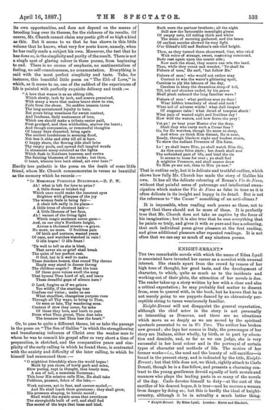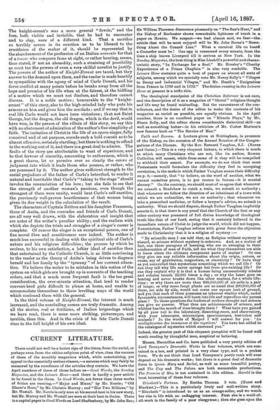KNIGHT-ERRANT.*
Tin two remarkable novels with which the name of Edna Lyall is associated have invested her career as a novelist with unusual interest. She stands apart from the crowd by reason of her high tone of thought, her good taste, and the development of character, to which, quite as mach as to the incidents and working-out of their plots, the attraction of her novels is due. The reader takes up a story written by her with a clear and also a critical expectation; he may probably find matter to dissent from, even to quarrel with, in the book, but he knows that he is not merely going to see puppets danced by an obtrusively per- ceptible string to tomes wearisomely familiar.
Knight-Errant will not disappoint the general expectation, although the chief actor in the story ie not personally so interesting as Donovan, and there are no situations which move ns so deeply as we are moved by the spiritual spectacle presented to us in We Two. The author has broken new ground ; she lays her scenes in Italy, the personages of her story are Italians, either wholly, by birth, or in part by educa- tion and domicile, and, so far as we can judge, she is very successful in her local colour and in the portrayal of certain types of character and methods of life. The motive of her former works—i.e., the need and the beauty of self-sacrifice—is found in the present story, and is indicated by the title, Knight- Errant ; but that title does not, we think, rightly attach to Carlo Donati, though be is a fine fellow, and presents a charming con- trast to the young gentleman devoid equally of both morals and manners who plays the leading parts in so many of the novels of the day. Carlo devotee himself to duty—at the cost of the sacrifice of his dearest hopes, it is true—and be rescues a woman from danger by doing so ; but this is hardly the ideal of knight- errantry, although it be in actuality a much better thing.
* Knight-Errant. By Edna Lys'''. London: Hurst and Blsokett.
The knight-errant's was a more general " devoir," and the foes, both visible and invisible, that he had to encounter and to slay, were of a different kind. That a sacrifice so terribly severe in its exaction as to be likened to the crucifixion of the maker of it, should be represented by the abandonment of the profession of an Italian annotate for that of a tenors who conquers fame at sight, or rather hearing, seems, thus stated, if not an absurdity, such a straining of possibility as must tax the powers of even a very skilful novelist to justify. The powers of the author of Knight-Errant are taxed, but they answer to the demand upon them, and the reader is made heartily to sympathise with the agony of mind of Carlo Donati, and his fierce conflict at many points before he breaks away from all the hope and promise of his life when at the fairest, at the bidding of a motive which we must not disclose, and therefore cannot discuss. It is a noble motive ; honourable to the " knight- errant " of this story, also to the high-minded lady who puts his armour on him and gives him the accolade ; and if we say that in real life Carlo would not have been victorious ; that not Saint George, but the dragon, the old dragon, which is the devil, would have won, in the person of the villain of this story, we say this with no abatement of admiration of the author's fine simplicity of faith. The imitation of Christ in the life of an opera-singer, fully conceived and of set purpose, sounds such a bold conceit as to be almost offensive, certainly startling; bat there is nothing to offend in the working-out of it, and there is a great deal to admire. The faults of the story are attributable to want of experience, and to that fervour of sincerity, amounting to enthusiasm, which is a great charm, let us perceive ever so clearly the errors of judgment into which it leads those who possess, or rather, who are possessed by it. The author gives sufficient strength to the social prejudices of the father of Carlo's betrothed, to render it natural and inevitable that Carlo's " taking to the stage " should involve the renunciation of his love ; but she fails to see that the strength of another woman's passions, even though the strongest of them were vanity, would heat Carlo's self•secrifice, the previously well-proven heartlessness of that woman being given its due weight in the calculation of the result.
The characters of Captain Britton and his daughter Francesca, those of Anita, and the comrades and friends of Carlo Donati, are all very well drawn, with the elaboration and insight that are notes of the writer's peculiar ability ; and the realism with which she depicts the trials and struggles of a singer's career is complete. Of coarse the singer is an exceptional person, one of fine moral fibre and sensitiveness rare indeed. The author is much less successful in dealing with the spiritual side of Carlo's nature and his religious difficulties ; the process by which he evolves, to his own satisfaction, a loftier ideal of sacrifice than that entertained by the Catholic Church, is as little convincing to the reader as the theory of Anita's being driven to disgrace herself and her family by the "tyranny " of her convent educa- tion. We believe the writer to be mistaken in this notion of the system on which girls are brought up in convents of the teaching orders, and that a much more frequent fault is the too great consideration, the over-minute attention, that tend to render convent-bred girls difficult to please at home, and unable to accommodate themselves to those levelling ways of the world which confound them with the generaL
In the third volume of Knight-Errant, the interest is much increased, and the concluding scenes are truly dramatic. Among all the stories, real or fictitious, of Italian brigandage which we have read, there is none more striking, picturesque, and terrible, than this. And in the crisis of his fate Carlo Donati rises to the full height of his own ideal.



































 Previous page
Previous page